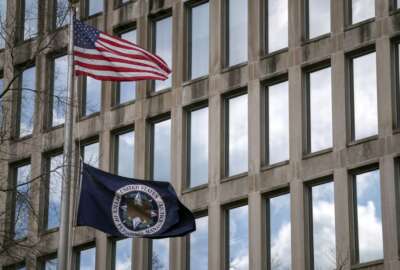Hubbard Radio Washington DC, LLC. All rights reserved. This website is not intended for users located within the European Economic Area.
On Air: Federal News Network
Trending:
What would a second term for President Obama mean for feds?
The administration promotes numerous policy and program successes and it is on these successes President Obama's second term priorities likely will be built. Th...
By Lisa Wolfe
Program director
(Correction: an earlier version of this story incorrectly identified Dan Blair, President of the National Academy of Public Administration.)
What the Obama administration hopes to accomplish in a potential second term rests on three factors: Making sure it has the right people in place to devise and communicate the best strategy possible and who also have the skill and the will to see it through; employing the most relevant technology tactics to accomplish the goals and committing the funding resources necessary for both.
In part 5 of Federal News Radio’s special week-long multimedia series, The Obama Impact: Evaluating the last Four Years, we focus on what feds can expect from four more years of President Obama in the White House.
Should President Barack Obama win a second term, expect more pressure on applying people and technology to save money.
The White House says it intends “to realistically estimate program costs, provide budget stability for the programs we initiate, adequately staff the government acquisition team, and provide disciplined and effective oversight.” Current initiatives such as strategic sourcing; reducing improper payments; cutting waste, fraud and abuse; energy sustainability efforts and acquisition reform will continue and possibly expand.

Linda Bilmes, the Daniel Patrick Moynihan Senior Lecturer in Public Policy at the Harvard Kennedy School of Government, adds another idea to save money — managerial accounting. Bilmes said managerial accounting takes into consideration not only actual cost of a procured item, such as a jet engine, but also all of the various costs associated with the vetting, legal, selection, monitoring, award and post-contract auditing processes. She said it could add 20 percent to 60 percent to the cost of the contract.
She said this priority for the next administration, specifically in the Defense Department, will be important.
The Defense Business Board estimates overhead when broadly defined makes up roughly 40 percent of the DoD’s budget. But Bilmes said, “there are no tools to prove this is true.”
“It’s a fairly heavy slog and a cultural shift in mindset to institute managerial accounting,” she said, adding since “we don’t have basic tools to understand where the money is spent, you can’t cut fat or duplication or overhead if you don’t know where money goes … and you can’t shrink administrative functions.”
“The net effect is DoD is at its highest funding level since World War II, but with fewer resources and products to show for it,” Bilmes said.
Look for the administration to continue to utilize the federal workforce and technology to create efficiencies, streamline processes and create openness.
Expect the administration to push agencies harder to comply with the standardized metrics for performance management. Also, an open and transparent government is here to stay.
The White House says agencies should “go beyond mere management of information technology projects and focus in addition on making sure they get the highest return on investments in information technology; being transparent and accountable for the status of projects on Federal websites such as the IT Dashboard; and ensuring the security of electronic information.”
A focus on data
A second term for the President means a similar focus on agencies providing data to an increasing number of dashboards and, among other things, continuing to share electronic health records between the Veterans Affairs and Defense departments.
Additionally, agencies will see ongoing efforts to reduce backlogs in security clearances, retirement applications and veterans benefits claims.
This is another area Bilmes sees for an administration focus in the next term.
“The [veterans claims] backlog has grown much longer over last few years despite the fact that administration has done everything humanly possible to make the current system work,” she said. “Veteran Affairs Secretary Eric Shinseki and Deputy Secretary Scott Gould are top-rate talent, but despite hiring and training more claims adjudication people and fixing IT problems, the backlog gets longer because the system itself is antiquated and vastly over complicated.”
Bilmes said VA should approve all of the standard claims from new veterans upfront and then audit them later.
A second Obama term could also mean dedicating people and technology to create a motivated and engaged civil service.
A streamlined federal hiring process will help in the commitment to develop contract specialists and cybersecurity experts. Efforts to increase the number of students, recent graduates, veterans and people with disabilities in federal careers will not ebb, nor will pursuing a reformed Senior Executive Service or the aggressive telework initiatives.
Money allocated will dictate priorities
Whatever priorities the White House decides for a second term will be dictated by the money allocated to accomplish them. Sequester or alternative spending cuts would have an effect on the range and scope of initiatives.

“Over the next four years the budget will likely drive policy rather than policy driving budget,” said Dan Blair, president of the National Academy of Public Administration. In July, NAPA and the American Society for Public Administration jointly issued several memos to incoming national leaders that recommends actions on how to strengthen the federal budget process. Among them:
- enacting a joint budget resolution annually that includes medium- and long-term targets for the debt and budget savings to reach the targets
- enforcing Presidential accountability by requiring an annual fall address on the fiscal outlook and how his budget addresses it
- prohibiting use of Continuing Resolutions to delay appropriations.
Blair, who was deputy director of the Office of Personnel Management during President George W. Bush’s second term in office, said if President Obama is re-elected “the atmosphere will be different.” Blair envisions “opportunities for bipartisanship” in an Obama second term. Based on his experience, Blair said, “The two most productive years in the Bush Administration were the two years after his re-election.”
A second term for an incumbent also brings opportunities to refine management goals and push for more progress. “The first four years with the Bush administration, there was an emphasis on implementation,” Blair said. OMB rolled out the President’s Management agenda in Bush’s first term. “During the second term, OMB raised the bar on agency expectations.”
Whatever the idea, the crafty use of both human and technology solutions are common threads sewn into the fabric of administration goals. Acknowledging the impending budgetary constraints, the White House will be finding ways to ensure these threads are pulled through in the next four years.
Federal News Radio also examines what a first-term presidency for Mitt Romney would mean for federal employees. Read the story.
More from the special report, The Obama Impact: Evaluating the Last Four Years
Part 1: Evaluating the Obama administration’s management initiatives
Part 2: Evaluating Obama’s technology reforms
Part 3: Evaluating Obama’s workforce initiatives
Part 4: Evaluating Obama’s acquisition efforts
Part 5: What will the next four years bring?
Copyright © 2024 Federal News Network. All rights reserved. This website is not intended for users located within the European Economic Area.




